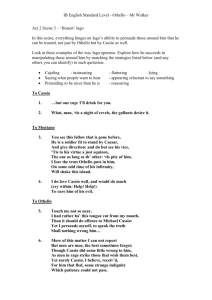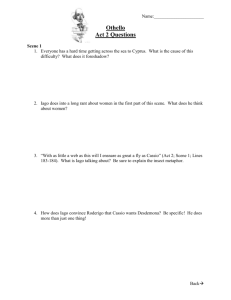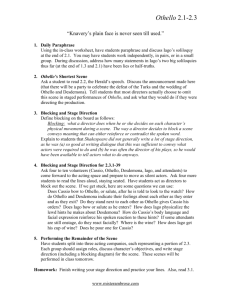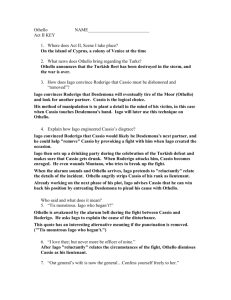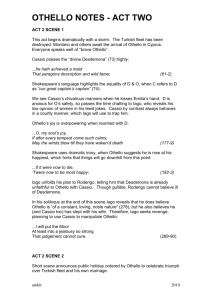Character Analysis - KISEnglish102008-2009
advertisement
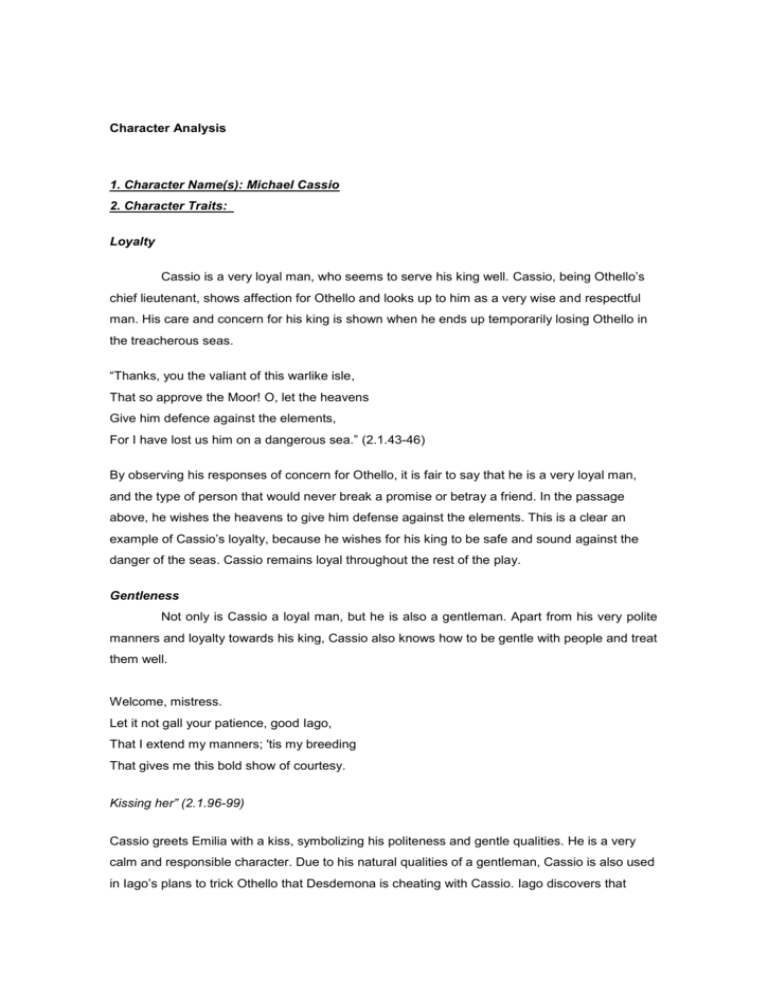
Character Analysis 1. Character Name(s): Michael Cassio 2. Character Traits: Loyalty Cassio is a very loyal man, who seems to serve his king well. Cassio, being Othello’s chief lieutenant, shows affection for Othello and looks up to him as a very wise and respectful man. His care and concern for his king is shown when he ends up temporarily losing Othello in the treacherous seas. “Thanks, you the valiant of this warlike isle, That so approve the Moor! O, let the heavens Give him defence against the elements, For I have lost us him on a dangerous sea.” (2.1.43-46) By observing his responses of concern for Othello, it is fair to say that he is a very loyal man, and the type of person that would never break a promise or betray a friend. In the passage above, he wishes the heavens to give him defense against the elements. This is a clear an example of Cassio’s loyalty, because he wishes for his king to be safe and sound against the danger of the seas. Cassio remains loyal throughout the rest of the play. Gentleness Not only is Cassio a loyal man, but he is also a gentleman. Apart from his very polite manners and loyalty towards his king, Cassio also knows how to be gentle with people and treat them well. Welcome, mistress. Let it not gall your patience, good Iago, That I extend my manners; 'tis my breeding That gives me this bold show of courtesy. Kissing her” (2.1.96-99) Cassio greets Emilia with a kiss, symbolizing his politeness and gentle qualities. He is a very calm and responsible character. Due to his natural qualities of a gentleman, Cassio is also used in Iago’s plans to trick Othello that Desdemona is cheating with Cassio. Iago discovers that since Cassio is such a positively remarked and attractive male character, it would make sense to above anyone else, that ladies would cheat with him, in this case Desdemona. Above, Cassio also mentions that he must “extend” his manners. This shows his emphasis on being polite and kind. In the book, Cassio shows no signs of anger or aggressiveness towards anyone as well. All his responses to even the worst things that occurred to him, for example when Iago stabbed him, don’t deal with foul language and over exaggeration. Cassio remains a gentleman from beginning to end of the play. Properness Probably as expected, Cassio also exists as a very proper man as well. It is evident that Cassio is a well educated man with the best of manners. He greets people in a friendly way and cares for them as much as possible. It is also very interesting that Cassio prefers more conventional ways of spending his leisure time rather than drinking. “Not to-night, good Iago: I have very poor and unhappy brains for drinking: I could well wish courtesy would invent some other custom of entertainment.” (2.3.31-34) Cassio also seems to enjoy music and the sight of beautiful women. This implies that he is an artistic man as well, which adds to his image as a very proper and elegant man. Many modern day performances depict Cassio as a young and quite handsome man. His image as the “perfect man,” can be derived from his exquisite qualities. His favorable characteristics make him a very easy character to like. In conclusion, the way Cassio looks, behaves, and almost everything else about him make him one of the most proper examples of a true man. Vulnerability Surprisingly, Cassio is also a very vulnerable character. Due to his unwillingness to become disrespectful, Cassio can be mostly recognized for the time he loses his captaincy after being tricked into drinking by Iago. This proves Cassio’s vulnerability, for his lack of decisiveness leads him to drink and eventually get into a brawl with Roderigo. Eventually out of being drunk, Cassio stabs Montano, the governor, when he tries to take the fight into a sudden halt. It is no mystery why Cassio feels such massive guilt after being revealed as the criminal; especially to the one man he praises so much: Othello. If we were to look at Cassio’s vulnerability in the long run, the one massive sign of it would be his involvement in Iago’s plans. Cassio is tricked by Iago, framed by Iago, and even wounded by Iago. Since Iago possesses a very brilliant and cunning mind, he takes Cassio’s young age and inexperience to his advantage. These are also some of the factors that contribute to his vulnerability. The scene below is the brawl between Roderigo and Cassio after the latter becomes drunk. “MONTANO Come, come, you're drunk. CASSIO Drunk! They fight” (2.3.152-153) 3. Character Motivations and Objectives: Cassio does not play a major part in the play of Othello. Instead, he often appears in the play as the one who is being “used and not the character who is making major decisions. Nonetheless, throughout the play Cassio does hold inside minor motivations and rather small objectives compared to the likes of Othello and Iago. His motivations/objectives fluctuate as his role in the play shifts from prosperous loyal follower; to practical bate for a trap. 1. Before taking part in Iago’s plans on the island of Cyprus, Cassio plays the simple role of Othello’s chief lieutenant. His duty in this position remains his main priority and objective, to serve Othello and protect him. His loyalty cannot be hidden, as he constantly seeks to do whatever is best to keep his king out of harms way. His motivation is evident in the following passage: “…O, let the heavens Give him defence against the elements, For I have lost us him on a dangerous sea.” (2.1.44-46) 2. As the play starts to reach its climax, Iago takes his plans into action and carries them out as each day passes by. Cassio has a major role alteration as well as a major motivation alteration. Now, as the reader knows, Cassio enters Cyprus as bait for Iago’s plans to drive Desdemona and Othello apart. Eventually Iago’s plans take an effect on Cassio. Most importantly, the most notable change in Cassio’s role and position happens after he becomes drunk and wounds the governor, Montano as shown in this passage: “MONTANO Come, come, you're drunk. CASSIO Drunk! They fight” (2.3.152-153) As a result, Cassio loses his position as chief lieutenant and loses Othello’s respect. In the end, Iago’s plans become successful. Meanwhile, Cassio experiences his motivation alteration. After losing his beloved position, Cassio’s new main objective becomes to motivate and persuade Othello that he to appoint him as chief lieutenant once again. He even attempts to impress him outside his bedroom window with a clown and many other random performances. His new motivation and objective can be seen here: “That, I being absent and my place supplied, My general will forget my love and service. DESDEMONA Do not doubt that; before Emilia here I give thee warrant of thy place: assure thee, If I do vow a friendship, I'll perform it To the last article: my lord shall never rest; I'll watch him tame and talk him out of patience; His bed shall seem a school, his board a shrift; I'll intermingle every thing he does With Cassio's suit: therefore be merry, Cassio; For thy solicitor shall rather die Than give thy cause away.” (3.3.17-28) Cassio’s objectives are clear, as he tries to make Desdemona feel pity for him. By doing this, he indirectly tells her to make Othello reconsider his decisions considering Cassio’s place under him. As shown above, one of Cassio’s many attempts are taken into consideration. 4. Language: “Bounteous madam, Whatever shall become of Michael Cassio, He's never any thing but your true servant.” (3.3.8-10) This selection best describes Cassio’s manner of speech. First of all, Cassio is very flirtatious with his words. He speaks to women by praising them (in this case Desdemona), normally in attempts to persuade her to do something, in this case, persuade Othello to reconsider his position as chief lieutenant. The use of “bounteous,” and “true servant,” are examples of his flirtatious way of speaking. Second, Cassio is very focused with his self image and people’s thoughts about him. This is evident by the way he mentions his name. He talks like this in order to emphasize his importance to Desdemona. This adds to the first important fact about his way of speech, because it makes women feel pity or sorry for him. Word Analysis Bounteous (ADJ) 1. “Bounteous madam, Whatever shall become of Michael Cassio, He's never any thing but your true servant.” (3.3.8-10) 2. Part of Speech: Adjective 3. “Giving or inclined to give generously.” (Direct quotation from Dictionary.com) 4. Etymology: Latin 5. Prefix: bounty – generous gift 6. Sentence: Please, bounteous sir, do you have spare change for the poor? 7. Source: Dictionary.com, com/browse/bounteous> 8. Jin Kwon 4 December 2008, <http://dictionary.reference. Paragon (V) 1. “Most fortunately: he hath achieved a maid That paragons description and wild fame; One that excels the quirks of blazoning pens, And in the essential vesture of creation Does tire the ingener.” (2.1.61-65) 2. Part of Speech: Verb 3. To equal/match 4. Etymology: Italian 5. Prefix: Para-alongside 6. Sentence: Only Maradona could paragon Peles brilliance during the 1990s. 7. Source: Dictionary.com, 4 December 2008, <http://dictionary.reference. com/browse/paragon> 8. Jin Kwon Prithee (N) 1. “Prithee, say true.” (4.1.126) 2. Part of speech: Noun 3. An expression used when asking a polite favor 4. Etymology: Latin 5. Sentence: “Prithee, may I be able to clean your bag for you?” 6. Source: Dictionary.com, 4 December 2008, <http://dictionary.reference. com/browse/prithee> 7. Jin Kwon 5. Visual: Are there any intriguing visuals of your character out there on the web? Include one or two pictures / clips. Make sure you indicate the source of your picture / clip. 6. Pod cast: In a one to two minute pod cast, explain what is most important to know about this character. Use the information you have collected above, using quotes to support what you say. Create pod cast in Garage Band Export to iTunes as an MP3 file Upload to your wiki page
